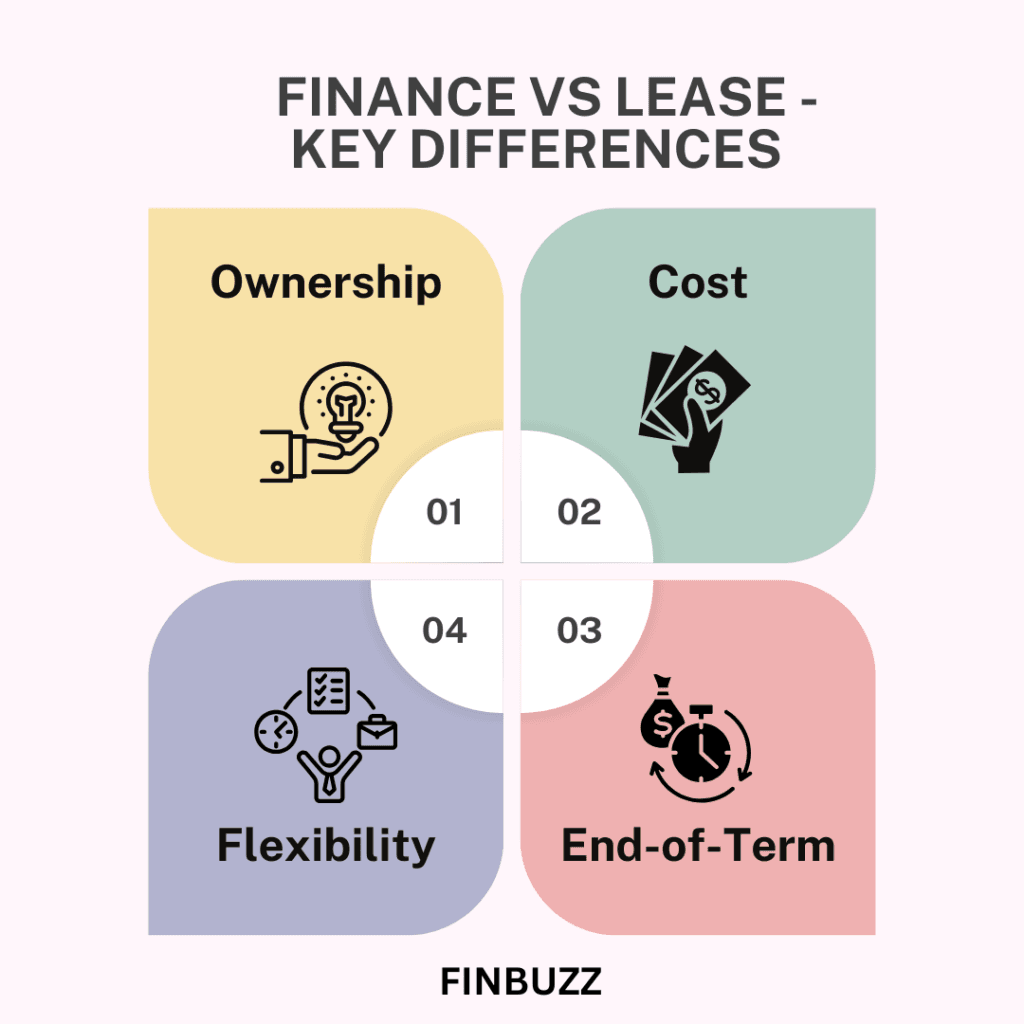Table of Contents
When you plan to buy assets, financial planning plays a pivotal role. Whether you wish to invest in a property or buy a vehicle, the dilemma is often between leasing and finance. While you explore these options, you will see that both have their own benefits and drawbacks.
It is thus significant for you to understand the difference between lease and finance to differentiate and decide which option will be apt for your requirements, considering your long-term financial goals too.
This article will educate you about these concepts, giving all the details you should know about leasing and financing. By the end of it, you can decide which option to go with while buying your next asset.
Importance of Choosing the Right Option for Acquiring Assets
Choosing the right method to buy your assets is one of the crucial decisions in regard to your financial planning. This decision impacts your operations and long-term financial goals, and a poor choice can lead you to financial stress.
In brief, leasing involves lower investment and flexible agreement terms. Whereas, financing offers ownership and equity. You should evaluate both options based on your requirements, budget, and financial goals to maximize the value of your money. Once you have made the right decision, you can keep multiplying the assets and enjoy a sound financial future.
What is Leasing?
Leasing is a legal agreement where one party ( the owner) allows the other party (the lessee) to use the asset in exchange for regular payments. The owner will retain the asset ownership, be it a property, vehicle, or machinery and the lessee gets access without getting involved in any kind of financial burden of making an instant expensive purchase.
Once you sign the lease, you can use the asset till your lock-in period ends and renew it at the end to continue using it.
Types of Lease
Operational Lease: It is a lease with a shorter lock-in period, ideal for individuals who want a faster conclusion of the agreement.
Finance Lease: It is a long-term lease type that is often signed where you have evaluated most risks and advantages of the ownership.
What is Financing?
Financing refers to the setup where you borrow money from a financial institute or a private lender to purchase an asset. A loan is a perfect example of financing. The amount you borrow is subject to interest over a period of time.
It means you will be paying way more than you borrowed as the interest gets added. However, once you fully repay the borrowed amount, you get complete ownership of the asset, making it a cost-effective option. Financing is available whether you want to buy a car, a property, business equipment, or machinery.
Types of Financing
Secured Financing: This loan is attached to the collateral, which is the asset you are buying most of the time.
Unsecured Financing: This loan is not bound to the collateral. You will pay a higher rate of interest for this loan type.
Key Differences Between Finance vs Lease
Now that you have got a brief idea about leasing and financing let us dig deeper and discuss what is the difference between finance and lease to help you in decision-making.

Ownership
In the leasing type, the lessor retains the ownership of the asset and just lets you use it if you pay the pre-decided payments as per the schedule you agreed upon.
On the other hand, in finance, you borrow the money in terms of the loan to purchase the asset. The borrower gains full ownership of the asset after completely repaying the loan.
Cost
In leasing, there is a lower monthly payment involved and negligible upfront cost. However, if you consider the overall money you spend by leasing, it is certainly a significantly high cost. On the other hand, financing involves an initial investment in the form of a down payment.
After that, you have to pay the regular installments to repay your loan. Though you pay the interest in this acquisition method, it is a cost-effective method as you get the ownership at the end.
Flexibility
In leasing, the asset usage is restricted in terms of usage, specifically considering the mileage limit or conditions like asset wear and tear.
On the other hand, financing offers unrestricted asset usage. You ultimately get the ownership, so you have all the rights. However, it also means that you have to take care of the wear and tear as well.
End-of-Term
If you opt for leasing, you can return the asset; and extend usage by renewing the lease. Moreover, there is also an option to purchase the asset at a predetermined price.
On the other hand, when you go with financing, the ownership gets transferred to your name. It is then your choice to keep or sell the asset.
Pros and Cons of Leasing and Financing
Whether you choose leasing or finance, both these acquisition methods have their perks and drawbacks. Let us dive deeper into this to give you more clarity about which one will comply with your long-term financial goals.
Leasing Pros and Cons
| Leasing Pros | Leasing Cons |
| You do not own anything, so it is easy to end the lease and move to an upgraded version. | You do not get any equity |
| The payments are fixed and pre-decided; which is a plus for efficient financial planning. | Long-term lease payments exceed the actual property cost. |
| The upfront cost or the initial investment is negligible. | Your usage rights are limited. |
Leasing Pros and Cons
| Financing Pros | Financing Cons |
| Freedom to modify your asset as per your wish | Monthly expenses are high |
| Cost-effective option in the long run | You have to take responsibility of the maintenance |
| Have the potential to build equity |
How to Choose?
Leasing and financing are the two acquisition methods that make asset buying possible for you. It is significant to analyze, and understand what’s the difference between finance and lease, and choose the method that complies with your financial goals and requirements.
Here are the aspects that you should keep in consideration while evaluating the two and choosing the right method.
Budget
Your budget is the primary consideration when choosing an acquisition method. If you do not have enough funds to cover the upfront cost, leasing is the right option for you.
On the other hand, if you can manage the initial investments and enjoy a long-term financial benefit, you should certainly go with financing.
Usage
Be clear about how you want to use the asset. If you just want to use it for a short time period, opt for the leasing option. Once your requirement is fulfilled, you can simply end the lease.
On the other hand, if you want it for long-term usage, financing would be an advantageous option.
Financial Goals
Another consideration you should have is your financial goal. Leasing is the apt option for you if you want to avoid long-term commitment to a depreciating asset.
Whereas, financing suits if you wish to own the asset and then sell it for higher profits.
Conclusion
It is a truly personal choice to opt for leasing or financing, as it depends on a number of factors, like your budget, goals, and requirements. While leasing offers flexibility and doesn’t not give you any maintenance-related responsibility, financing makes you the owner, allowing you to use the asset as you please.
It is vital for you to understand both concepts in detail, learn about their differences, and then decide which one would comply with your budget and requirements. Once you land on the right option, you can ensure maximum value from your investment.



